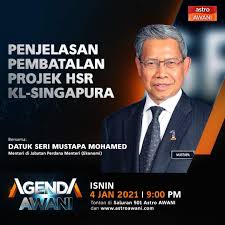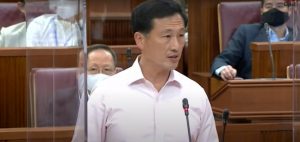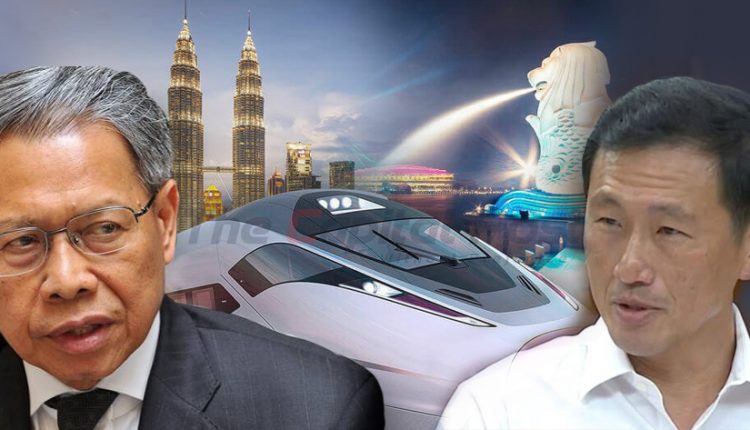Kuala Lumpur, 5 Jan 2021 (The Capital Post)- On New Year’s day we all heard the news of cancellation of the Kuala Lumpur-Singapore High-Speed-Rail (HSR) project which would have been a 350 Kilometre stretch rail line between Malaysia and Singapore.
There are many speculations behind the reason why the project got cancelled despite the bilateral agreement signed between Singapore and Malaysia back in 2016.
Malaysia
The actual project was proposed by the 6th Prime Minister of Malaysia, Datuk Seri Najib Razak and formally agreed by Prime Minister Lee Hsien Loong of Singapore in 2013.
The 2018 General Election 14 (GE14) has brought a huge change in the political landscape of Malaysia where Tun Dr Mahathir has been appointed as the new prime minister defeating Najib Razak.
He initially said the project will be postponed due to the high cost and again Malaysia went through a political crisis in 2020 which saw Tan Sri Muhyiddin Yassin become the 8th prime minister of Malaysia.
The deadly coronavirus played a vital role in the cancellation of the HSR project, in the perspective of Malaysia.
On Jan 4, Minister in the Prime Minister’s Department (Economy) Datuk Seri Mustapa Mohamed, took to his Facebook page with a long posting to make it clear to the public the changes proposed by Malaysia on the project and reason behind the cancellation.
According to Mustapa Mohamed the past 6 months discussion on the project was not fruitful and ended with both governments agreeing to cancel the project, with possibilities Malaysia need to pay compensation amount for the cost incurred by Singapore government for the project.
In a latest interview with Astro Awani, Mustapa Mohamed highlighted that reducing the cost of the project to 30% was one of the changes proposed by the government.

Other than that, Malaysia also proposed to start the project 2 years earlier to help revive the economy hit by the pandemic, which directly opens the doors for high value employment and business opportunities.
In the Facebook post, the senior minister also stated that the government proposed a new structure for the HSR project and included that the HSR be connected and integrated with the available transportation network in the country.
Followed by the intensive discussions over the period of 6 months, the governments failed to reach an agreement on the proposed changes by Malaysian government.
Singapore
The Singapore government, on the other hand, has declined the proposed changes by Malaysian government.
In the Singapore parliament, Transport Minister Ong Ye Kung, says that both governments have signed two supplementary agreements relating to the suspension of HSR project in 2018 and 2020 which both agreements come at Malaysian government’s request.

“Singapore was fully committed to carry out our obligations under the HSR project but Malaysia felt the circumstances have changed including due to the Covid 19 and proposed several changes”, added Mr Ong.
The one significant change that could not be accepted by the Singapore government was proposed removal of Assets company (AssetsCo) which is the system supplier and network operator of HSR project.
The transport minister further explained, “Because neither country has the expertise and experience in operating the HSR, we agreed under the HSR bilateral agreement to appoint a best-in-class industry player through an open and transparent international tender to assume the role of AssetsCo”.
“Prior to the appointment AssetsGo will supply the fundamental train system, operate the network and also ensure that the appropriate priority is given to cross-border HSR service vis-a-vis Malaysia’s domestic service, and be accountable to both Singapore and Malaysia”, he added.
To Singapore the AssetsGo is the centrepiece of the project and is essential to ensure that the interest of both countries is protected.
“This will minimise the possibility of future disagreements and disputes over the long duration of the project, lasting decades,” said Mr Ong.
“Singapore therefore informed Malaysia that the removal of the AssetsCo constituted a fundamental departure from the HSR bilateral agreement, and could not be accepted.
Malaysia has since decided to allow the HSR bilateral agreement terminated” he added.
The Compensation
According to The Straits Times (Singapore), the cost incurred for Singapore is 270 Mil.
The compensation will include abortive costs such as consultancy services, design of infrastructure and manpower to deliver the HSR projects.
Singapore is also verifying a “small component” of miscellaneous abortive costs” for the suspension of the project requested by Malaysia.
The transport minister of Singapore also said the exact figure of the compensation could not be revealed due to confidentiality reasons which was similar to what told by Mustapa Mohamed on his Facebook post on 4th Jan.
According to Mr Ong, Singapore is open for new proposals on the project but only after the settlement of the current HSR bilateral agreement. – The Capital Post

